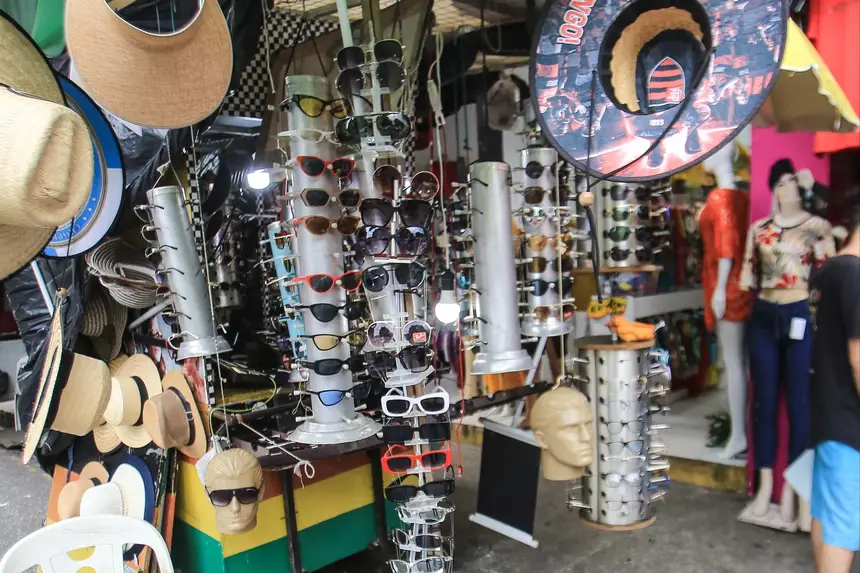Metropolitan Polyclinic warns: sunglasses without protection can harm vision
Ophthalmologist from the unit, Pedro Lins, advises on how to choose the ideal accessory to ensure eye health in any season of the year

With sunnier days and an increasingly frequent outdoor routine, wearing sunglasses becomes part of the daily life of many people. However, the Metropolitan Polyclinic, in Greater Belém, issues an important warning: more than a fashion accessory, sunglasses should be chosen carefully, as models without adequate protection can cause serious harm to eye health. Prolonged exposure to ultraviolet radiation, when not properly filtered by the lenses, increases the risk of eye diseases and can compromise vision in the long term.
“It is important to ensure that the sunglasses have UV-400 certification or provide total protection against UV-A and UV-B ultraviolet rays. Using glasses without this protection, or with a fake seal, can be even more harmful than not wearing any, as dark lenses increase pupil dilation, allowing a greater amount of ultraviolet radiation to reach the eyes,” explains the unit's ophthalmologist Pedro Lins.
The specialist emphasizes the importance of polarized lenses for those seeking more comfort when wearing sunglasses. “They filter annoying reflections on surfaces like water and sand, providing greater visual comfort, reducing eye fatigue, and improving image contrast. Therefore, they are the ideal choice for those who spend a lot of time outdoors, especially under the strong sun of the Amazon summer,” highlights the ophthalmologist.
Regarding lens color, Pedro Lins states that UV protection is the most important, but each shade offers specific benefits: “Gray is versatile and suitable for any situation. Brown lenses reduce glare and enhance contrast, ideal for driving and sports. Yellow lenses are useful in low-light environments. Colors like blue, pink, and red serve an aesthetic function and do not increase protection or comfort,” he adds.
Regarding lens material, the ophthalmologist emphasizes the preference for polycarbonate due to its lightness and high resistance to impacts and scratches. “In addition to protecting against ultraviolet rays, this type of lens ensures visual clarity and comfort, making it the ideal choice to face the strong sun of the Amazon region,” concludes the professional.
Care and Durability
Ophthalmologist Pedro Lins, who works at the unit managed by the Institute of Social and Environmental Health of the Amazon (ISSAA), in partnership with the State Department of Public Health (Sespa), emphasizes that the durability of sunglasses is a fundamental aspect to ensure eye protection.
“Over time, lenses can lose their ability to block ultraviolet rays, especially if they are of low quality or suffer scratches and damage. Therefore, it is important to regularly check the condition of the accessory and replace it every two or three years, or whenever you notice wear or reduced protection. Glasses without adequate protection leave the eyes vulnerable to sun damage,” warns the specialist.
The doctor also recommends that, to ensure safety when purchasing sunglasses, it is ideal to always request the invoice and check if the UV certification is clearly visible on the product. “It is essential to avoid buying sunglasses in places without proven provenance, as these products may not offer adequate protection against solar rays, putting eye health at risk,” he emphasizes.
For those who already wear prescription glasses, ophthalmologist Pedro Lins advises: “There are options that ensure sun protection without giving up visual correction, such as dark lenses with prescription, photochromic lenses that darken automatically in sunlight, or clip-on models that can be attached over regular lenses,” he reinforces. The professional states that, regardless of the choice, it is essential to follow the medical prescription.
Finally, the specialist advises that visual discomfort when wearing sunglasses can be a warning sign. “If you feel discomfort, blurred vision, or light sensitivity when wearing sunglasses, do not ignore these signs. Consult an ophthalmologist. The right care makes all the difference for your eye health,” concludes the doctor.
Check out extra tips from the ophthalmologist for choosing sunglasses:
Avoid lenses with bubbles, scratches, or distortions – Visual imperfections indicate low quality and can harm vision;
Prefer frames that cover the eye area well – This prevents lateral entry of solar radiation;
Test clarity and visual comfort – Low-quality lenses can cause blurred vision, eye strain, and headaches;
Check the durability of the frames – Flexible and durable materials prevent breakage and discomfort with continuous use;
Do not buy sunglasses on impulse – Take time to analyze quality, protection, and comfort before making the final decision.










